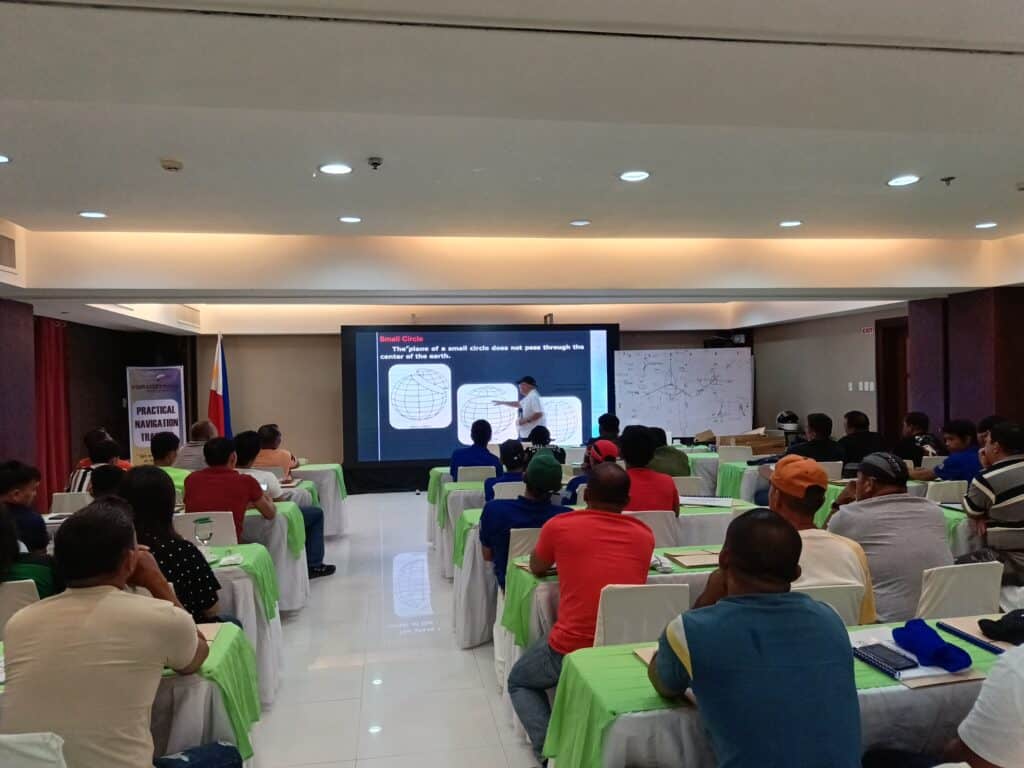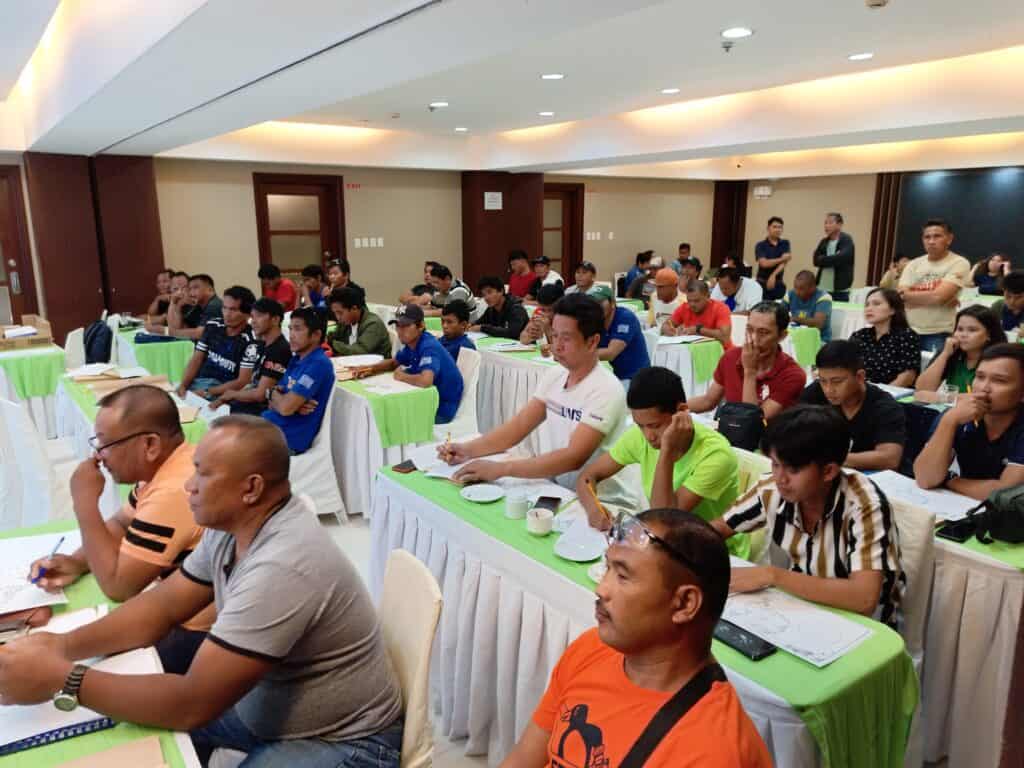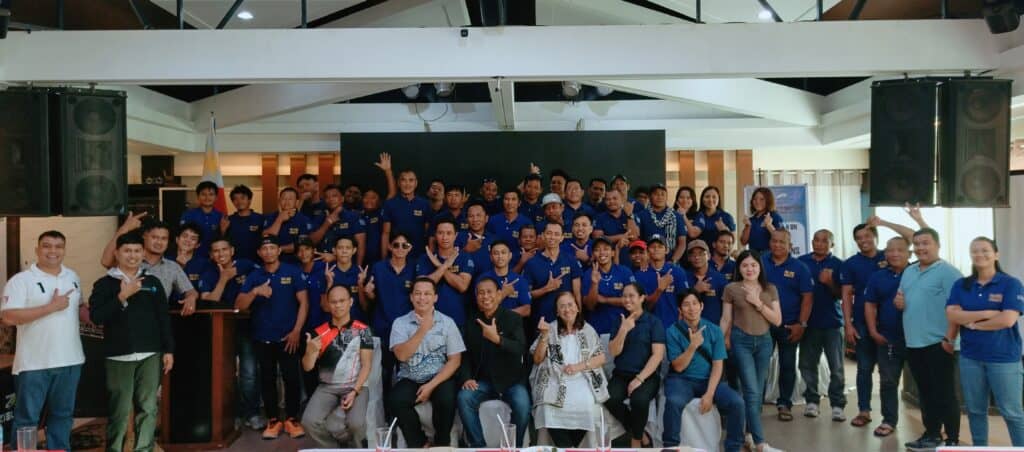
Tuna Handliners oriented about MSC Certification and FIPs
General Santos City (May 13, 2024) – Gearing the Philippine tuna industry towards sustainability, the Bureau of Fisheries and Aquatic Resources (BFAR) kicked off the 6th wave of its 4-day Capacity Building program for Tuna Handliners at the East Asia Royale Hotel in General Santos City.
The opening session featured an orientation on the Marine Stewardship Council’s (MSC) eco-labeling program and its potential benefits for the industry, along with the FFSAPI-SARGEN Handline Fisheries Improvement Project (FIP).
Project Officer from SOCSKSARGEN Federation of Fishing and Allied Industries, Inc. (SFFAII) showcased the contribution of the region to the national and international tuna market in terms of volume, value, and livelihood contribution.
The three core principles of the Marine Stewardship Council Certification Standards were outlined: 1) maintaining healthy fish stocks, 2) preserving marine ecosystems, and 3) ensuring effective fishery management. To obtain this, the Fishery Improvement Projects will emphasize the intention to help the fishery achieve MSC certification by addressing concerns such as overfishing, bycatch reduction, and improved fishery management methods. The FFSAPI-SARGEN Handline FIP was introduced, a collaborative effort among seafood processing sectors, supplier groups, and government and non-government agencies, all of which are key actors in the initiative.
The fishers were left a message that this program is a great opportunity and a positive step toward a more sustainable and responsible Philippine tuna industry. Cooperation and collaboration is the key towards progress, with the support of BFAR and other stakeholders, sustainable fishery will translate to Philippine tuna handliners’ livelihood sustainability and the nation’s food security.
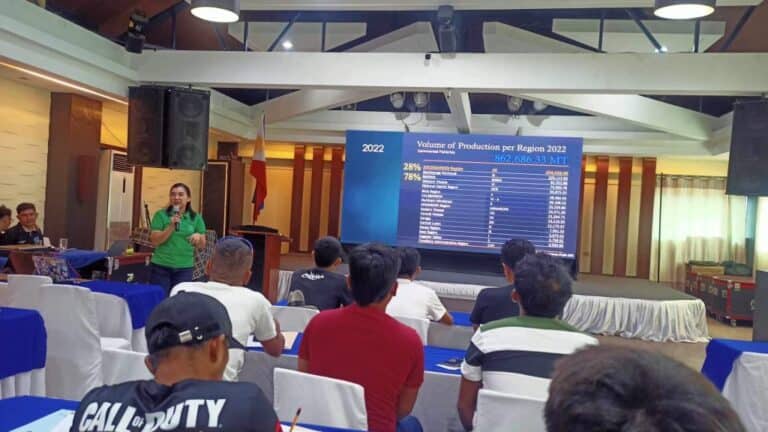
Tuna Fishers Learn How Regulations Protect Marine Environments
General Santos City (May 14, 2024) – The 4-day Capacity Building Training for Tuna Handline Fishers by the Bureau of Fisheries and Aquatic Resources (BFAR) equipped tuna handline fishers with knowledge of conservation management measures, relevant fishery laws, rules, and regulations on May 13, 2024, at the East Asia Royale Hotel.
Mr. Peter Erick Cadapan, a fisheries expert from the Bureau of Fisheries and Aquatic Resources’ Marine Fisheries Development Center (BFAR-MFDC), provided a comprehensive overview of the conservation and management measures in place to ensure the long-term sustainability of tuna fisheries. These measures aim to prevent overfishing and protect spawning grounds, allowing tuna populations to replenish naturally. Mr. Cadapan also addressed the importance of international cooperation in managing tuna stocks, as these fish are highly migratory and their health depends on coordinated efforts across different countries.
Dr. Alma C. Dickson, BFAR consultant, discussed particular fishery rules in the Philippines. The topics she covered included the Handline Fishing Law (Republic Act No. 9379) and FAO 254, which is the Regulation on Group Handline Fishing Operations in International Waters. Moreover, to educate the fishers about FADs, Dr. Dickson discussed the National Tuna FAD Management Policy (FAO 244). To wrap things up, she emphasized the critical role these laws play in keeping fisheries abundant, protecting marine environments, and ensuring the well-being of fishing communities.
Next, Licensing Rules and Regulations Applicable to Tuna Handline Fishing Vessels and Fishermen was discussed by Mr. Severino Escobar, Jr., Chief of BFAR Fisheries Regulatory and Licensing Services – Capture Fisheries and Licensing. His presentation included details about the process for registering a fishing boat, ensuring it meets specific size requirements, and outlining the prescribed number of crews for safe and sustainable operations. By adhering to these regulations, fishers can help combat Illegal, Unreported and Unregulated (IUU) fishing.
In conclusion, understanding these regulations awakens and fosters a sense of responsibility among fishers. Overall, the session put emphasis on the critical role the laws play in keeping fisheries abundant, protecting marine environments, and ensuring the well-being of fishing communities.
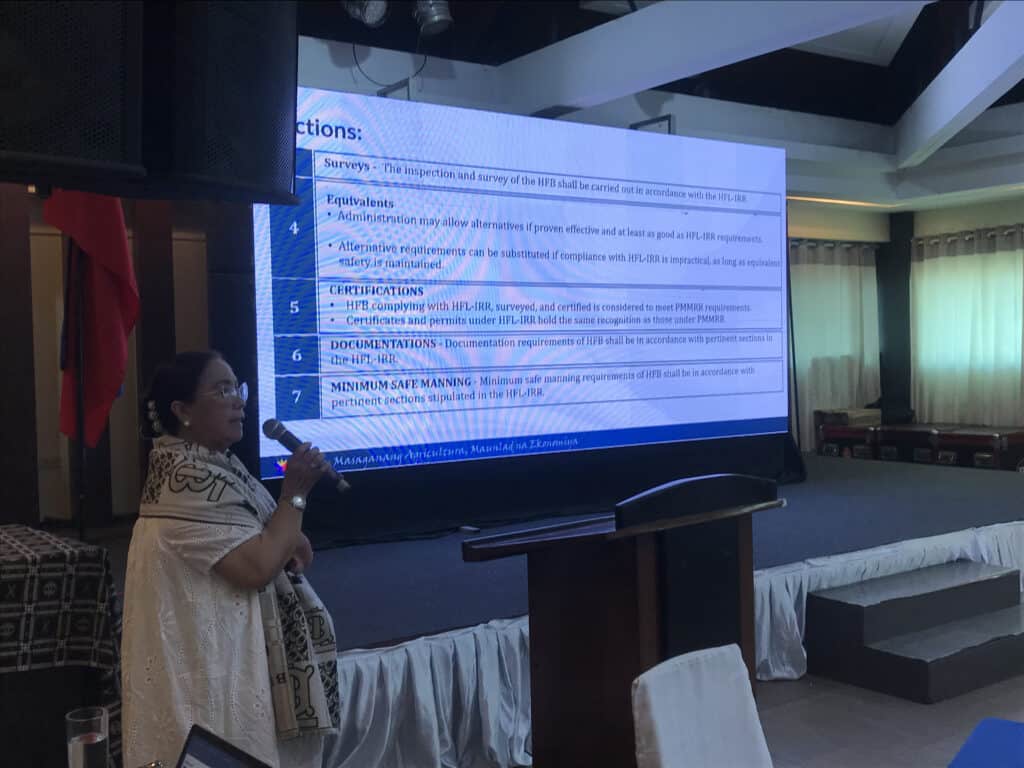
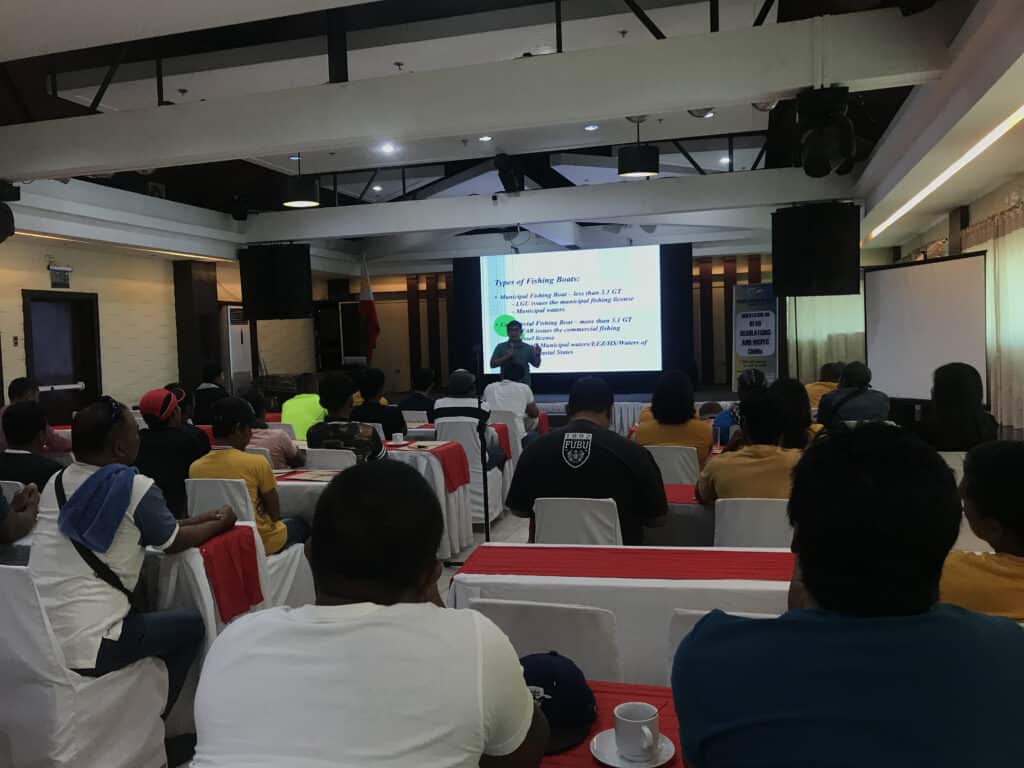
Species Identification Workshop Equips Tuna Handliners for Responsible Fishing
General Santos City (May 15, 2024) – Noting the importance of accurate species identification in responsible fishing, the Bureau of Fisheries and Aquatic Resources (BFAR) incorporated a Fish Species Identification Session on the third day of their 4-day capacity building training program held at the East Asia Royale Hotel in General Santos City.
First, Mr. Aldrin Gultian presented the by-catch species typically encountered in handline fishing, such as turtles and sharks. He emphasized the importance of responsible handling practices to minimize harm and ensure the survival of these vulnerable animals. Mr. Gultian also highlighted regulations regarding bycatch, such as recording and reporting incidents, and stressed the importance of following these guidelines to protect marine biodiversity and ensure the sustainability of the fishery.
Then, Mr. Renie Siocon covered several areas of tuna species identification, including biology and appearance. The core objective of the session was to empower participants with the ability to recognize commonly caught tuna species using handline methods.
Fishers who can accurately identify their catch gain valuable insights into the health and composition of the tuna population. This knowledge can inform decisions about fishing practices and contribute to more sustainable fishing methods. Moreover, this is to avoid incidence of misidentification due to a lack of knowledge and resources.
To conclude the activity, a species identification practicum was facilitated to test the fishers ability to recognize species based on the lecture provided.
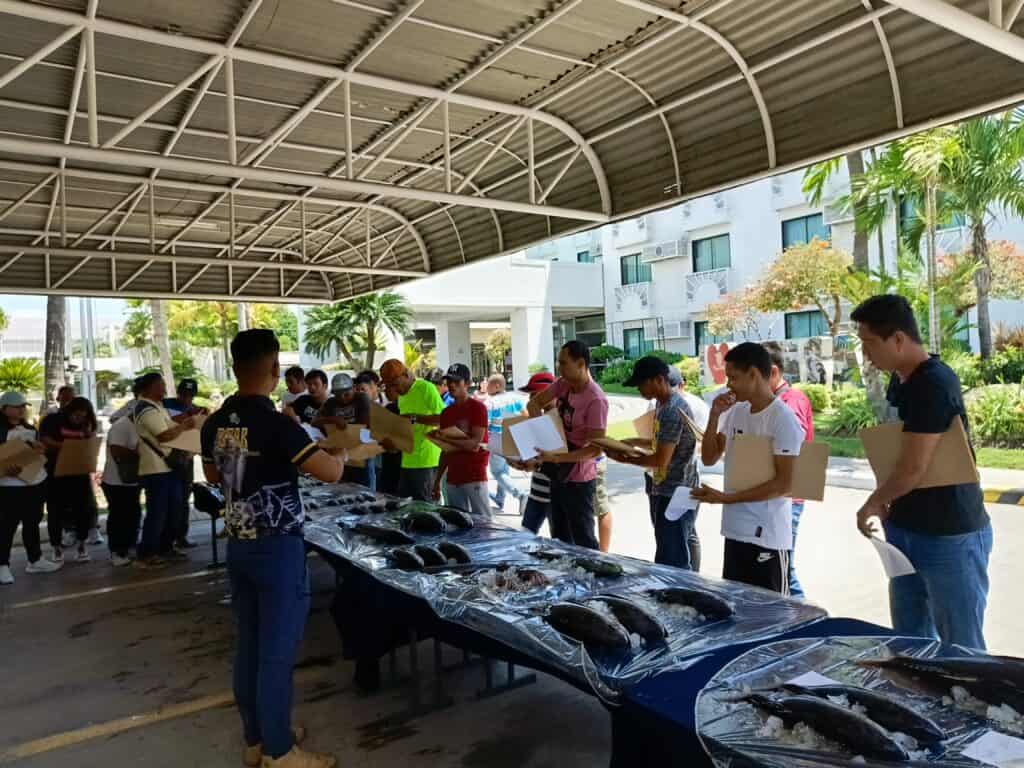
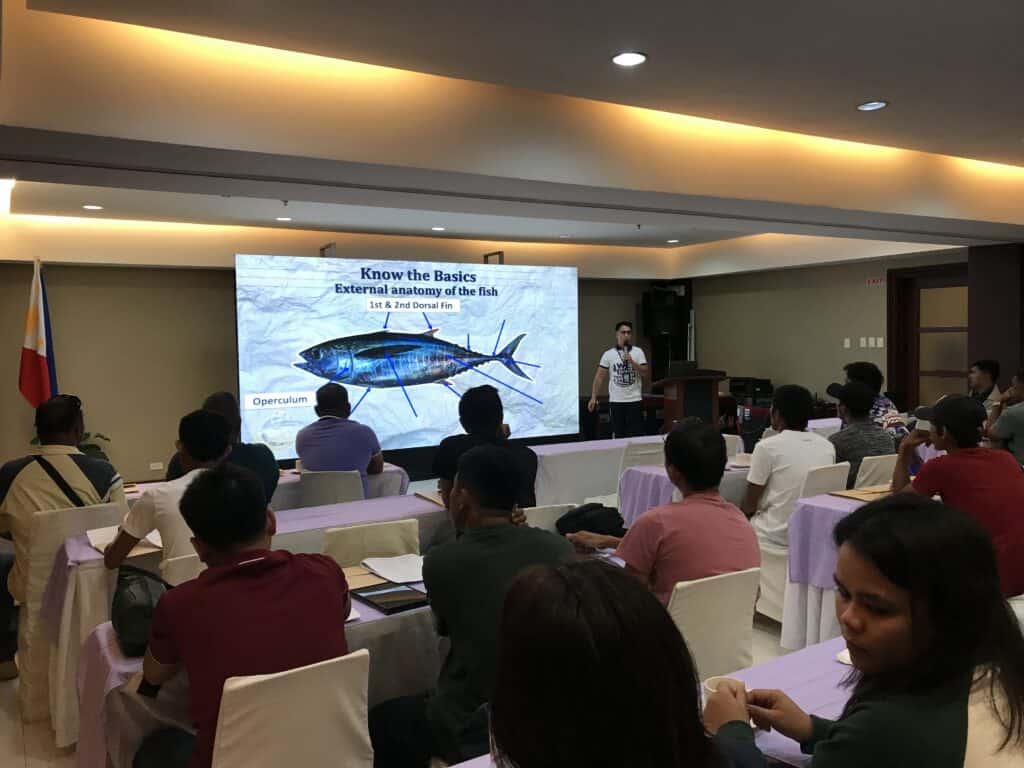
BFAR Training Program Enhances Skills of Tuna Handline Fishers on Proper Tuna Handling
General Santos City (May 14, 2024) – Beyond catching fish, ensuring their quality and safety is paramount in the seafood industry. To equip tuna handline fishers with the knowledge and skills on proper tuna handling, on its second day, the 4-day Capacity Building Training of the Bureau of Fisheries and Aquatic Resources (BFAR) tackled Fish Handling and Shelf Life and Onboard Handling and Hygiene Practices held at the East Asia Royale Hotel in General Santos City.
Mr. Rey Caballero from BFAR Region 12 led the session on proper tuna handling practices. His presentation covered the entire process, from the moment the fish is hooked all the way through landing, cleaning, chilling, and storage onboard the vessel. These techniques ensure the tuna reaches consumers in its freshest and safest state, while also aligning with responsible fishing practices.
Additionally, Mr. Freddie Mauricio Jr., representative from the BFAR Post Harvest Technology Division discussed the Onboard Handling and Hygiene Practices on Tuna Handline Fishing Vessels in accordance with Fisheries Administrative Order 227. This included details on proper methods for bleeding, gutting, and gilling the tuna to minimize spoilage. Mr. Mauricio also addressed hygiene protocols for crew members, proper storage temperatures for the catch, and sanitation procedures for the fishing vessel itself.
Following the lectures, a practicum was conducted at the Gensan Fishport Complex. Caballero and Mauricio led the activity by observing proper handling procedures and hygiene practices in the fishing vessel, as well as demonstrating the proper methods of gilling and gutting. To gain understanding on how the tuna is graded, a demonstration was also given by Mr. Nilo of GS Pescador Sea Trading.
The activity concluded with a wrap-up activity on what was observed in the held practicum. The session aimed to empower handline fishers to handle tuna responsibly, minimizing waste and spoilage, maintaining high-quality standards, and contributing to a sustainable and safe seafood supply chain.
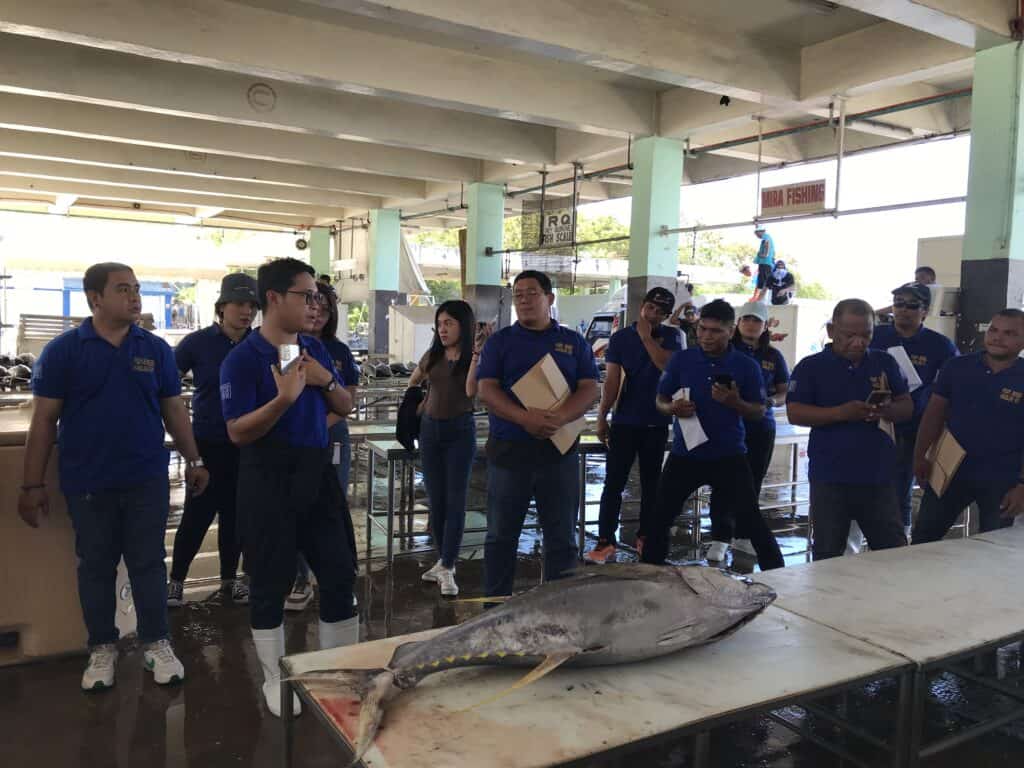
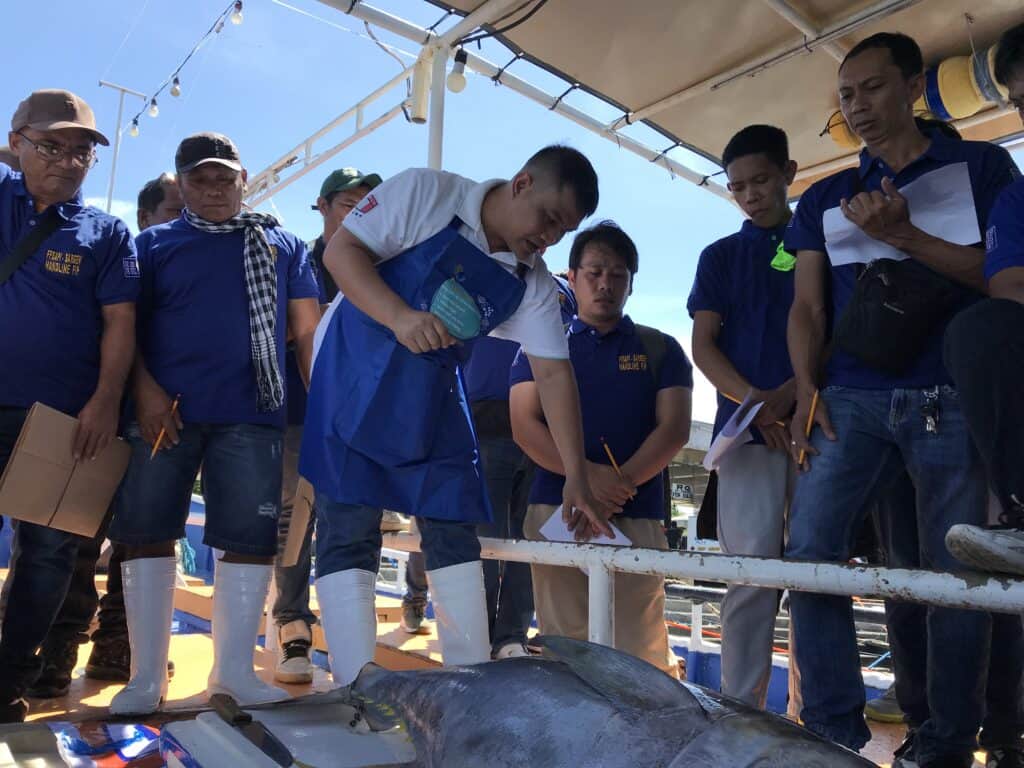
Traceability through Proper Catch Documentation
General Santos City (May 15, 2024) – On the 3rd day, a session on Proper Catch Documentation was conducted as part of the 4-day Capacity Building Training of the Bureau of Fisheries and Aquatic Resources (BFAR) held at the East Asia Royale Hotel in General Santos City.
Mr. Peter Erick Cadapan, a fisheries expert from the Bureau of Fisheries and Aquatic Resources’ Marine Fisheries Development Center (BFAR-MFDC) explained the significance of documenting catch as this holds crucial information to the health of the fish stocks and over-all marine ecosystem. Mr. Cadapan further emphasized the importance of compliance for fishers, but he also went beyond simply following the rules. He explained how accurate catch documentation empowers fishers by allowing them to trace their catch from bait to plate.
To teach the fishers how to fill-out the prescribed handline log sheet, Mr. Beverly San Juan of BFAR thoroughly explained each part of the log sheets: from fishing vessel information, daily catch data and location details, to species identification and fishing activity codes, tuna length and weight calculation. He stressed the impact of keeping daily records of catch volume and value (both tuna and bycatch), catch location, and fishing activities on board. This data is vital for traceability since it provides first hand information on where and how fish are caught.
The fishermen were then separated into groups and tested their knowledge of log sheet completion with practical exercises. They were provided an onboarding scenario and instructed to complete the log sheet so that Mr. San Juan could provide comments and ensure correct capture of data.
By actively participating in accurate catch recording, fishers become partners in the vital task of protecting the ocean. This commitment to documenting their catch translates into accountability for the fish they harvest, demonstrating a dedication to preserving these aquatic resources for themselves, future generations, and the entire marine ecosystem.
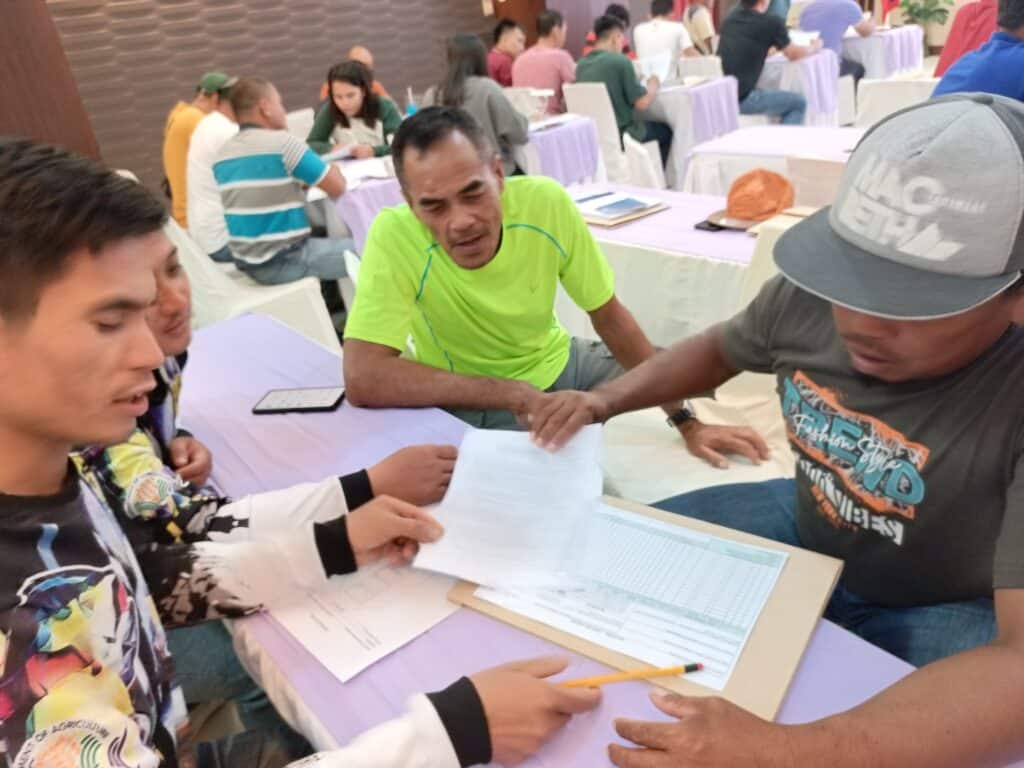
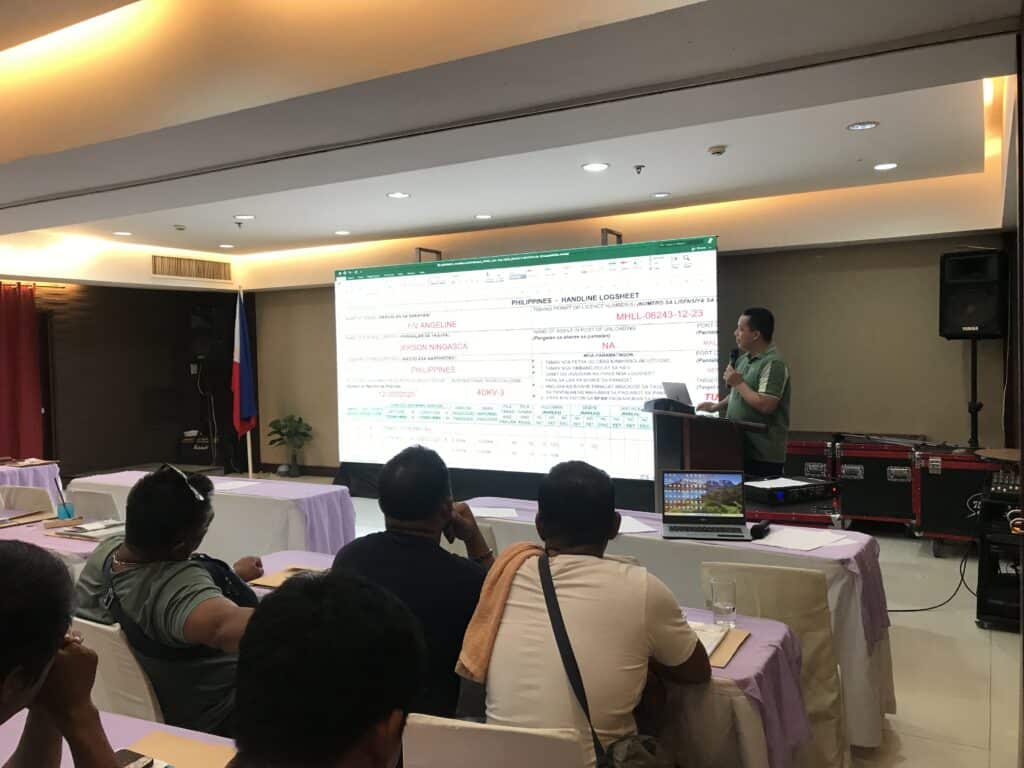
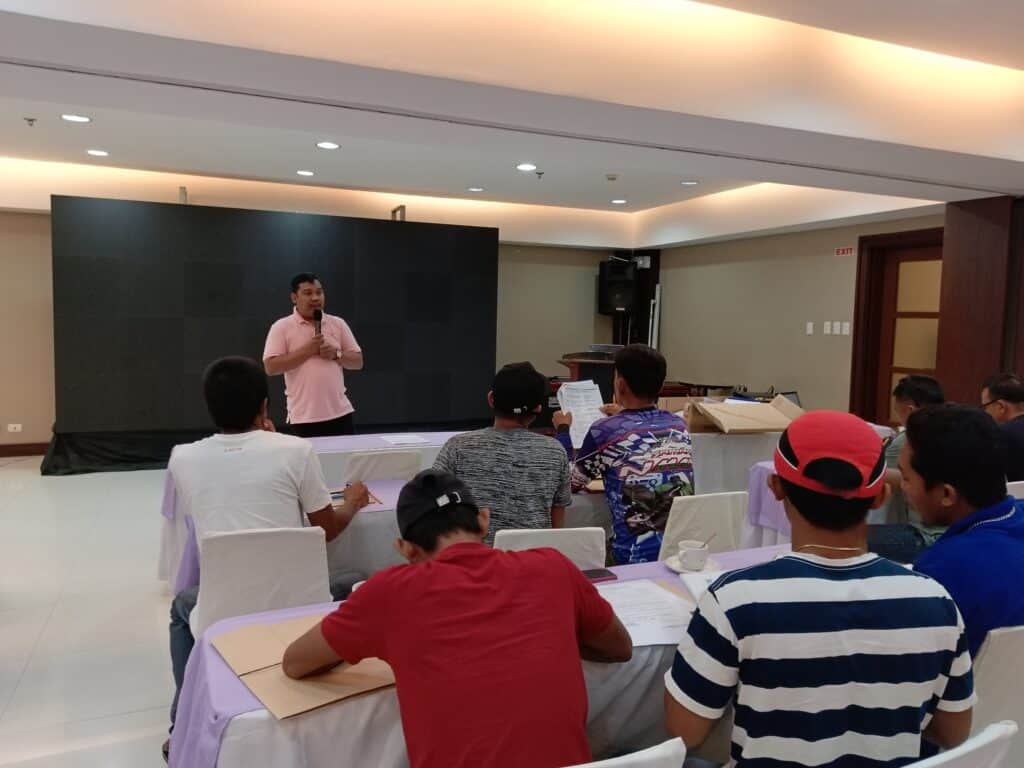
Minimizing Bycatch, Maximizing Sustainability: Training for Responsible Fishing
General Santos City (May 15, 2024) – To raise awareness to fishers and reiterate the importance of sustainable fishing practices, a session on Management of Bycatch, Conservation and Management of Sharks and Proper Hooking Techniques was conducted as part of the 4-day Capacity Building Training of the Bureau of Fisheries and Aquatic Resources (BFAR) held at the East Asia Royale Hotel in General Santos City.
Mr. Napoleon Salvador Lamarca tackled the management of bycatch and the species of special interest. He highlighted the National Plan of Action for the Conservation and Management (NPOA) of Sharks and the guidelines set forth by the Food and Agriculture Organization (FAO) of the United Nations. These frameworks provide a comprehensive roadmap for ensuring the long-term health of shark populations globally.
He further stressed the importance of education and awareness. Lamarca believes that we can ensure the sustainability of shark fisheries, protect vulnerable species, and mitigate the impact of fishing on these important marine predators.
Additionally, Mr. Remegio Salinas discussed the Rules and Regulations for the Conservation and Management of Sharks for Philippine Fishing vessels (FAO 272). These regulations aim to strike a balance between responsible fishing practices and the conservation of shark populations.
His presentation focused on the set regulations to protect vulnerable species, and promoting responsible fishing practices, and emphasized how these regulations contribute to the health of shark populations and the overall health of marine ecosystems. Salinas encouraged fishers that following these regulations is not just about legal compliance, it’s about long-term sustainability.
Lastly, Mr. Alvin Ignacio discussed the use of different hooks commonly used in longline/handline operations. His topics covered the selection of right hook size and type for targeted tuna species that will impact catch rates and minimize unwanted bycatch. He also explained about the proper hook setting practices to ensure efficient capture while minimizing injury to the fish.
Going beyond hook selection and setting techniques, Mr. Ignacio also emphasized the importance of safe and responsible hook removal. He demonstrated techniques tailored to the delicate nature of certain bycatch species, such as sharks and turtles. This involves using specialized tools like dehookers or decongesters to minimize injury and stress on the animal. Mr. Ignacio highlighted the importance of prioritizing the well-being of the bycatch while ensuring the safety of the fishers themselves.
